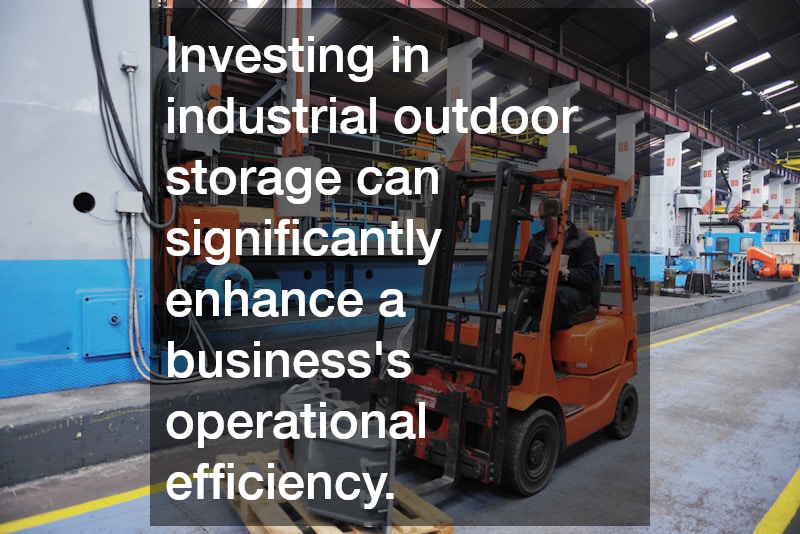Industrial storage refers to the use of outdoor spaces for storing materials, equipment, and goods related to business operations. Unlike traditional indoor warehouses, outdoor storage areas offer a more flexible and often cost-effective solution for accommodating large or bulky items. This type of storage is particularly advantageous for industries that deal with equipment that can withstand environmental elements, such as construction or agriculture.
One of the primary benefits of industrial outdoor storage is the ability to maximize space utilization. Businesses that require extensive room to store large machinery or equipment find outdoor options favorable as they can better organize and manage their inventory without the constraints of indoor space limitations. Additionally, this method can result in significant cost savings, particularly for businesses expanding their operational capabilities.
Despite the apparent advantages, businesses must assess their needs and compliance with regulatory requirements before committing to outdoor storage solutions. Factors such as weather conditions, security concerns, and material suitability for outdoor storage must be considered carefully. By conducting a thorough evaluation, companies can determine whether industrial outdoor storage aligns with their operational objectives and logistical frameworks.
Benefits of Investing in Industrial Outdoor Storage
Investing in industrial outdoor storage can significantly enhance a business’s operational efficiency. One of the most compelling benefits is the reduced cost associated with securing and maintaining indoor warehouse space. Outdoor storage eliminates the need for expensive climate control systems, often translating into substantial financial savings for businesses with equipment resilient to environmental changes.
In addition to cost savings, outdoor storage solutions can improve workflow efficiency. With the ability to store items closer to operational areas, businesses can reduce the time and resources spent on transportation and handling. This proximity not only streamlines operations but also minimizes the risk of delays caused by logistical challenges, thereby enhancing overall productivity.
Moreover, industrial outdoor storage provides businesses with the flexibility to scale their operations with ease. As companies grow, their storage needs evolve, and outdoor storage offers a scalable solution that allows for incremental expansion without the need for significant infrastructure changes. This adaptability ensures that businesses can accommodate increasing demands without incurring the high costs associated with traditional indoor warehousing.
Drawbacks and Considerations
While industrial outdoor storage presents numerous advantages, it is not without limitations. One of the primary concerns is exposure to environmental elements, which can potentially damage sensitive equipment or materials. Businesses must weigh the cost of potential weather-related damage against the savings and convenience of outdoor storage solutions.
Security is another critical consideration when opting for outdoor storage. Without the protection of walls, stored items may be more vulnerable to theft or vandalism. Implementing robust security measures, such as surveillance systems and secure fencing, becomes essential to mitigate these risks and ensure the safety of valuable assets.
Compliance with local zoning and environmental regulations is another factor to consider. Businesses must ensure that their outdoor storage practices meet all legal requirements to avoid fines or operational disruptions. It is essential to consult with local authorities and conduct due diligence to navigate any potential regulatory hurdles successfully.
Choosing the Right Storage Solution for Your Business
Selecting the appropriate storage solution depends on several key factors, including a business’s specific needs, industry requirements, and growth objectives. Companies must analyze their inventory characteristics and determine whether items can withstand outdoor conditions while maintaining functionality and integrity. Items like durable machinery and construction materials are often well-suited for industrial outdoor storage.
Additionally, businesses should consider the long-term scalability of their storage solution. Opting for outdoor storage can provide the necessary flexibility to adapt to changing demands, allowing companies to expand their storage capacity incrementally without significant infrastructure modifications. This scalability can be a strategic advantage for businesses forecasting future growth.
Finally, each business must evaluate its financial situation and weigh the cost benefits of outdoor versus indoor storage solutions. By comparing potential savings on operational expenditures and initial investment with potential risks and additional security costs, companies can make informed decisions that align with their fiscal strategies. Ensuring that the chosen storage method supports business continuity and growth objectives is crucial for sustained success.
Investing in industrial outdoor storage offers businesses a strategic opportunity to optimize their operational efficiency and scalability. Businesses that require storage solutions for bulky or weather-resistant items can significantly benefit from the cost savings, workflow improvements, and adaptability that outdoor storage provides. The ability to store items closer to operational use points can also streamline processes and improve productivity across the board.
However, it is imperative for businesses to carefully evaluate potential drawbacks, including weather-related risks and security issues, before committing to outdoor storage solutions. Factoring in regulatory compliance and necessary security measures is essential to maintain operational integrity and avoid legal complications. Businesses must balance the advantages of outdoor storage with these considerations to ensure a fruitful investment.
Ultimately, the decision to invest in industrial outdoor storage should align with a business’s overarching strategic goals, financial objectives, and operational capacity. By conducting a comprehensive assessment of their storage needs and options, companies can position themselves to leverage the myriad benefits of outdoor storage while addressing potential challenges with informed strategies. This approach ensures a harmonious integration of storage solutions within the business’s broader operational framework.


